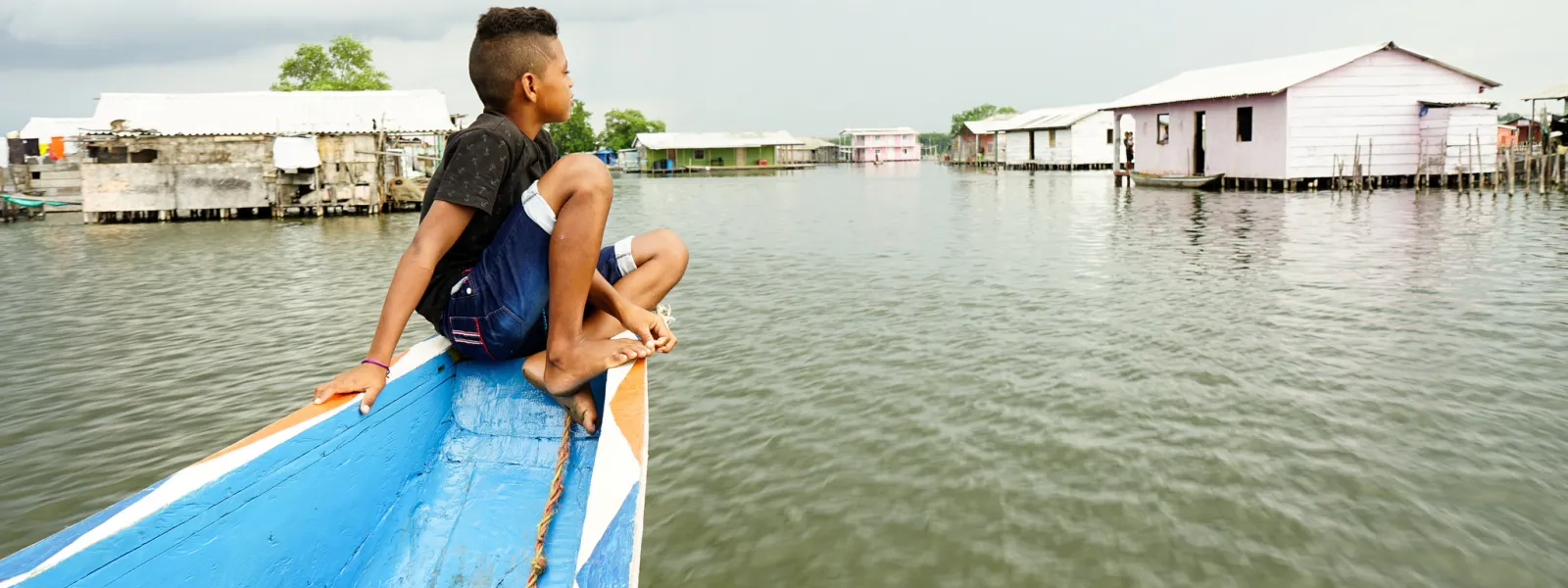
Project
Photo: Anna Laurie Miller / AIDAConserving the Ciénaga Grande de Santa Marta
Ciénaga Grande de Santa Marta, the largest and most productive coastal wetland in Colombia, covers 45,000 hectares. At the confluence of the Magdalena River and the Caribbean Sea, the site boasts an immense variety of flora and fauna, including mammals, birds and fish. Its southern tip is a beautiful sanctuary of mangroves, swamp and amphibious forest.
On the calm waters of the marsh stand the Ciénaga’s famous stilt villages, supported by pillars or simple wooden stakes and inhabited by local fishermen since 1800. In a place accessible only by water, many of the things we take for granted—being served a glass of water, quick access to a doctor—are considered luxuries. Residents depend on the natural world around them. Sadly, in recent years mass fish die-offs caused by the marsh’s degradation have threatened the livelihoods of 2,500 people who call the Ciénaga Grande home.
Illegal activities are destroying this vital ecosystem: intentionally set forest fires, deforestation of large tracks of land for agriculture and livestock, logging and burning of mangroves, and 27 kilometers of illegally built dikes.
This destruction not only devastates the local fishery; it also has global impact. Ciénaga Grande’s mangroves absorb large quantities of carbon dioxide from the atmosphere, aiding in the global fight against climate change.
The importance of the Ciénaga Grande has been recognized both nationally – the Sanctuary of Flora and Fauna Ciénaga Grande de Santa Marta is a national park – and internationally: UNESCO’s Man and the Biosphere program declared the lagoon a biosphere reserve; and the Ciénaga Grande is listed as a Wetland of International Importance under the Ramsar Convention, an intergovernmental treaty for the protection of wetlands.
AIDA and our partners are advocating for the Colombian government to fulfill its national and international obligations to protect the Ciénaga Grande. After all, millions of animals, the local community, and our global climate depend on it.
Partners:
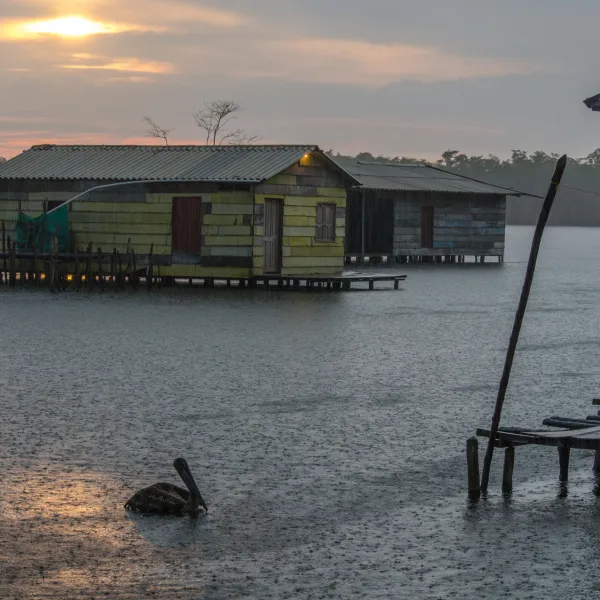
Related projects
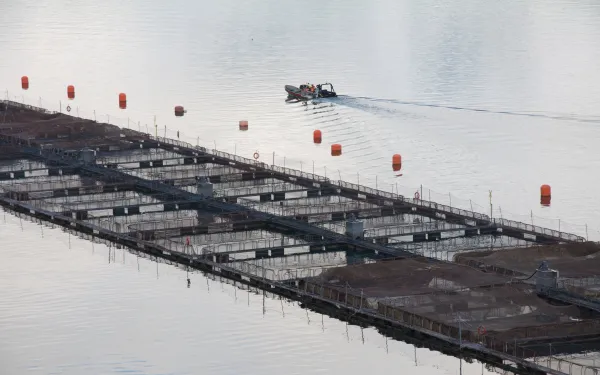
Chile’s Salmon Farms: Sustainability is Impossible
By Florencia Ortúzar Chile is the second largest producer of salmon in the world. For more than 20 years, the industry has put profit above environmental protection. In the absence of government regulation, large-scale salmon farms release contaminating chemicals and create oceanic dead zones. They hurt other species and harm the people and communities that depend on the ocean for sustenance. The situation is bad, but it could get worse as the industry looks to expand into new areas of pristine waters. Bad Practices Salmon farming in Chile will never be sustainable because it requires much more protein to operate than it generates. Salmon are carnivorous. To produce one kilo of salmon you need about five kilos of wild fish for feed. Years of bad business practices and lack of government regulation have resulted in serious environmental damage, which has, in turn, brought grave social consequences to those who depend on seafood for their livelihoods. On the Big Island of Chiloé, for example, seaweed and shellfish gatherers, artisanal fishermen and people who work in plants that process wild-caught fish are experiencing massive unemployment. This social crisis is a direct result of the environmental catastrophe caused in large part by the salmon industry, which has extensive operations in the area. In Chile, developers must present declarations or environmental impact studies that examine their project’s potential to harm nature. Despite the great risk to ecosystems, salmon farms are supported by mere affidavits, and not by studies that would allow for the identification and proper handling of potential negative impacts. The result is thousands of salmon hatcheries. Each one consists of floating cages that, without sufficient spacing or adequate sanitation, house thousands of salmon crammed into small spaces (half the space allowed in Europe). Although it seems difficult to believe, and despite the law saying otherwise, in Chile no studies have been done on the ability of the ocean, lakes, and rivers to accommodate the number of salmon that are grown. These captive salmon are fed pellets that contain a mix of wild fishmeal, pesticides, dyes, fungicides, and chemicals used to speed growth. A majority of these pellets are not consumed and simply fall to the seabed. Additionally, each salmon is injected with an exorbitant quantity of antibiotics (up to 5,000 times more than used in Norway). Finally, the waste generated by the fish, which contains chemicals, also accumulates on the ocean floor. More than 20 years of these practices have caused dead zones in the ocean where life is no longer possible. Another serious problem with the industry is that salmon often escape from their cages. According to a report by the NGO Terram, escaped salmon in Chile represent 1.5 percent of the total production, equivalent to more than 9,000 tons per year. Some studies report that this percentage could reach as high as five percent. Although by law farms must have recapture plans, they rarely succeed. Salmon are an aggressive fish. When free, they compete with native fish for food and shelter, and transmit disease. Crisis in the Sea In May, Chile’s coasts were devastated by an unprecedented red tide, believed to be the country’s worst recent environmental crisis. The natural phenomenon, characterized by an excessive increase in microalgae, resulted in the beaching of whales, squid, sardines and even birds. Captive salmon were also affected and the industry suffered huge losses: thousands of tons of salmon carcasses rotted in floating cages. The death rate was such that the national maritime authority authorized the release of 9,000 tons of dead salmon into the sea. According to the salmon industry and the government, the red tide was caused by El Niño, which was aggravated by global warming. However, some scientists have said that the salmon industry is largely to blame for submitting the ocean to their bad practices for so many years. Patagonia Without Salmon Farming! Not only has the salmon industry not learned from its mistakes, but it is also looking to expand into new, uncontaminated waters. It’s happening in the Patagonia regions of Magallanes and Aysen, where approximately 3,100 applications for salmon farms are awaiting approval. Farms were even proposed for places declared as priority conservation sites. Together with our allies, AIDA is working to ensure salmon farming and other industries comply with environmental standards. But there’s something you can do too, as citizens and consumers. Vote with your pocketbook. By purchasing only sustainable seafood products, you can help prevent the creation of more dead zones in our oceans.
Read more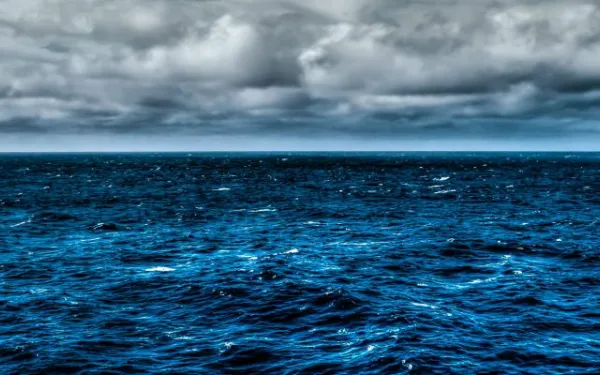
Celebrating hope for oceans
By Gladys Martínez This month I’m celebrating my tenth anniversary with AIDA. For a decade now, I’ve been working for environmental justice and realizing one of my lifelong dreams: defending that which has no voice. In all this time, my best clients have been the oceans and their coasts. Experience has taught me that life depends on the oceans. That’s why I was happy to spend my anniversary working to create a new treaty to protect life in the high seas. The high seas are considered international waters, and because they belong to no country, there is no legal protection for the plants and animals that call them home. A treaty that provided that protection would give a second chance to the oceans and to those who most depend on them: all of us. Time for reflection Throughout my career as an environmental attorney, I’ve worked to limit the negative impacts of illegal and excessive fishing. On behalf of AIDA, and in alliance with our partner organizations, I’ve used international law to promote sustainable fishing and the conservation of wetlands, mangroves, and coral reefs. During the last several years I’ve had the honor of working beside Sandra Moguel, AIDA’s marine attorney in Mexico. Because of Sandra’s dedication and leadership, we’ve been able to preserve Mexico’s ocean, coastline and the communites threatened by short-sighted development. Sandra recently moved on from AIDA to work with our partners at the Mexican Center for Environmental Law (CEMDA), as Director of their Southeast Regional Office. Though I, and all of us at AIDA, will miss having her by our side, her new position fills me with great hope for Mexico, and the fight to defend the country’s rich environmental heritage. Sandra’s work to protect Mexico’s coastal wetlands, rivers, and oceans will not soon be forgotten. We will build upon her successes and continue the fight to preserve our region’s waters and defend the communities that depend upon them. A new hope That fight took me most recently to New York City, with the High Seas Alliance, to assist in the development of the high seas treaty. This year I’ve participated in two sessions of the treaty’s Preparatory Committee, alongside State representatives and civil society. We aim to complete the agreement within two years. It will be implemented under the United Nations Convention on the Law of the Sea. As a representative of AIDA, the only Latin American organization involved in the treaty’s planning meetings, I’m working to ensure the high seas recieve the same protections as the national waters we’ve fought so long to defend. The high seas treaty is a truly collaborative effort that holds great hope for the protection of our planet’s international waters. Responsible to my region As a Costa Rican, I feel a responsibility to care for the natural heritage of Latin America. I also believe in the importance of creating marine reserves in international waters. Doing so would reduce the pressure of fishing on marine resources, create a more balanced environment, and ease the stress ecosystems and their inhabitants face when adapting to climate change. The international waters that surround our region are blessed with many areas of great importance to the high seas, known as “ecologically significant areas.” They are: The Costa Rican Dome. Located in the Pacific Ocean, the Dome is constantly changing location depending on the wind and ocean currents. It houses breeding, feeding, and birthing zones for tuna, blue whales, sharks, dolphins, sea turtles, and many other species. The White Shark Café. Located in the international waters of the Pacific Ocean, between the Baja California Peninsula and Hawaii, the area is a key meeting place for white sharks, a species in great danger, which gather there after leaving the coasts of Mexico and Florida. The Sala y Gomez and Nazca Ridges. Stretching for more than 3,000 kilometers through the southeast Pacific, the ridges extend beyond Chilean waters, where they are protected by the State. Offshore sections remain unprotected, despite the fact that they contain some of the highest levels of marine biodiversity in the world. The ridges shelter blue whales, leatherback sea turtles, swordfish, and Chilean mackerel, among other species. Most of the underwater mountains are still found in their natural state, making protection paramount. The Atlantic Equatorial Fracture Zone. Located between Brazil and the Guinea Basin, this fracture zone belongs to no country. It is a source of food and energy for different species of fish (among them yellowfin tuna, bigeye tuna, and swordfish), as well as for green and leatherback sea turtles. Protecting the high seas is vital to providing a safe space for the feeding, breeding, and growth of many important marine species. As I look forward to another 10 years, my dream remains the same as it ever was: working to protect these great creatures and the waters they call home; giving them a voice; and advocating for the preservation of our region’s greatest natural treasures.
Read more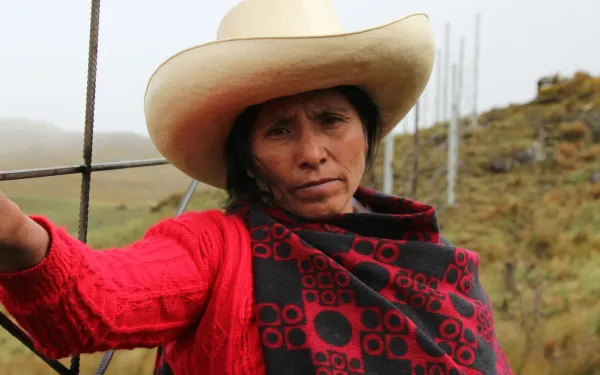
Latin American environmental defender attacked, hospitalized
Goldman Prize winner Máxima Acuña de Chaupe reportedly attacked by mining company security guards. Washington, D.C. Goldman Environmental Prize winner Máxima Acuña de Chaupe was hospitalized after being attacked, allegedly by security forces hired by Minera Yanacocha, a subsidiary of Denver-based Newmont Mining, according to information provided by the Chaupe family. The attack took place on Máxima’s property in northern Peru that the mining company has been trying to obtain for its Conga gold mine project. “Minera Yanacocha must immediately stop their harassment of Máxima and her family, denounce attacks like this one, and call on its employees, agents and all others to ensure her safety,” said Earthworks’ Executive Director Jennifer Krill. The attack against Máxima is an alarming reminder of the murder earlier this year of Honduran activist Berta Cáceres. Berta was the 2015 Goldman Environmental Prize Winner from South and Central America. Both Berta and Máxima put their lives at risk by publicly denouncing multinational corporations threatening their communities. “Environmental defenders like Máxima, and the late Berta Cáceres before her, should not have to risk their lives to protect their homes and communities,” said Martin Wagner, managing attorney at Earthjustice. Máxima, who has lived in Tragadero Grande since the early 1990s, has been beaten, intimidated, and even sued by Minera Yanacocha. In 2014, Peruvian courts ruled in Máxima’s favor in an ongoing criminal complaint by the company. In April, prominent civil society groups including Global Witness, Sierra Club, Earthjustice, Earthworks, SumOfUs and others wrote to Newmont calling on the company to drop its lawsuits against the Chaupe family and end their harassment. The company failed to respond. "The Chaupe family has been harassed and beaten by Yanacocha for years," said Katie Redford, Founder and Director at EarthRights International, which has been supporting and advising the Chaupe family. "They are prepared to pursue all legal options to obtain justice." This most recent attack highlights the failures of both Newmont and the Peruvian government to uphold security, human rights and the consent of local communities. Newmont has ignored multiple calls from civil society to stop the physical and legal harassment of the Chaupe family, and the Peruvian government has failed to provide security for the Chaupe family as ordered by the Inter-American Commission on Human Rights (IACHR). “Everyone involved in the mine project – the companies, the government, the security forces – is responsible for ensuring Máxima’s safety,” said Martin Wagner of Earthjustice. “By failing to speak and act against it, they are condoning this kind of attack and creating further risk to Máxima, not to mention their own reputations.” In February, Newmont filed a statement with the Securities and Exchange Commission indicating that they were no longer pursuing the proposed Conga mine that threatens the Chaupe home. “Newmont needs to immediately address the alleged involvement of its subsidiary Yanacocha in the criminal harassment of Máxima and her husband. Newmont has reported to investors that it isn’t pursuing the Conga mine, but these attacks on poor subsistence farmers indicate that further plans are in development. What's happened is shocking, and shareholders need to know the potential risk of such an unethical venture,” said Glen Berman, Interim Executive Director of SumOfUs. For more information: Goldman Prize profile of Máxima Acuña de Chaupe: http://www.goldmanprize.org/recipient/maxima-acuna/ Blog about the Conga project cancellation: https://www.earthworksaction.org/earthblog/detail/conga_no_va#.V-BPtJMrK-4 Civil society letter to Newmont, April 2016: https://www.earthworksaction.org/library/detail/letter_to_newmont_re_maxima_acuna Grufides website: www.grufides.org
Read more